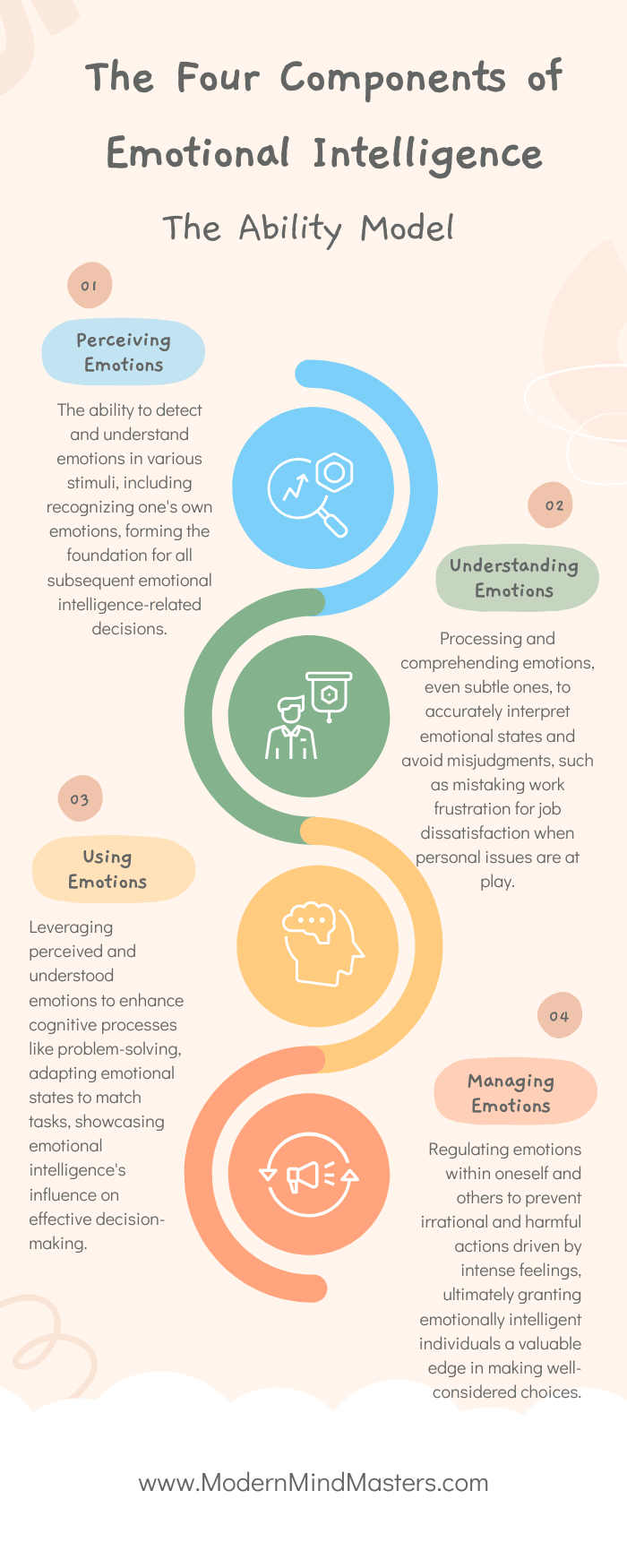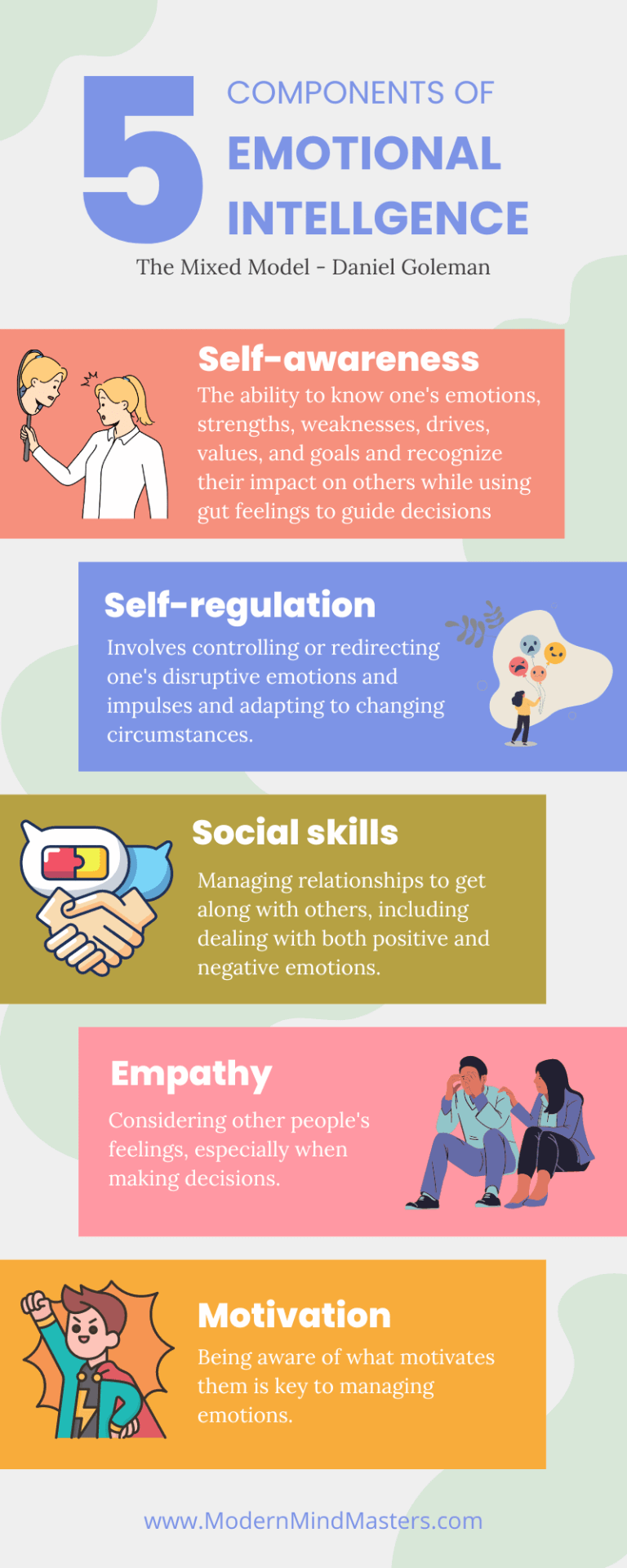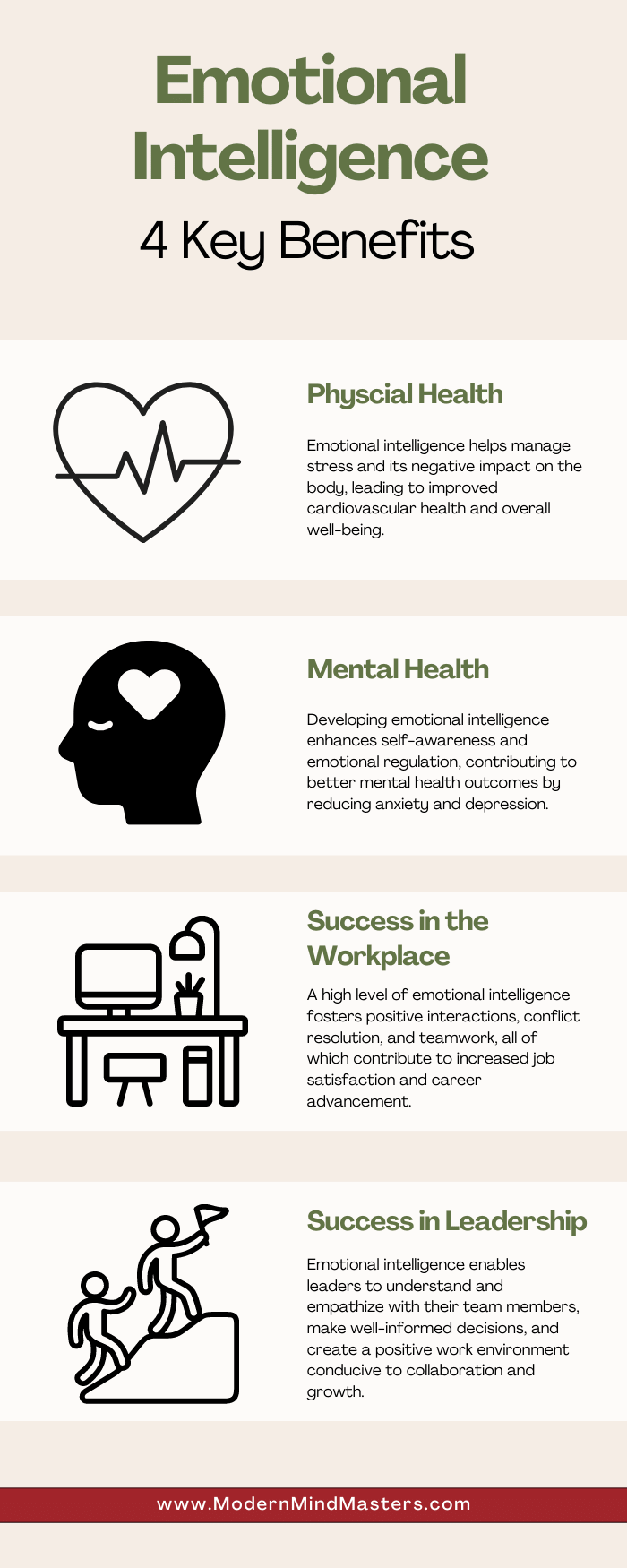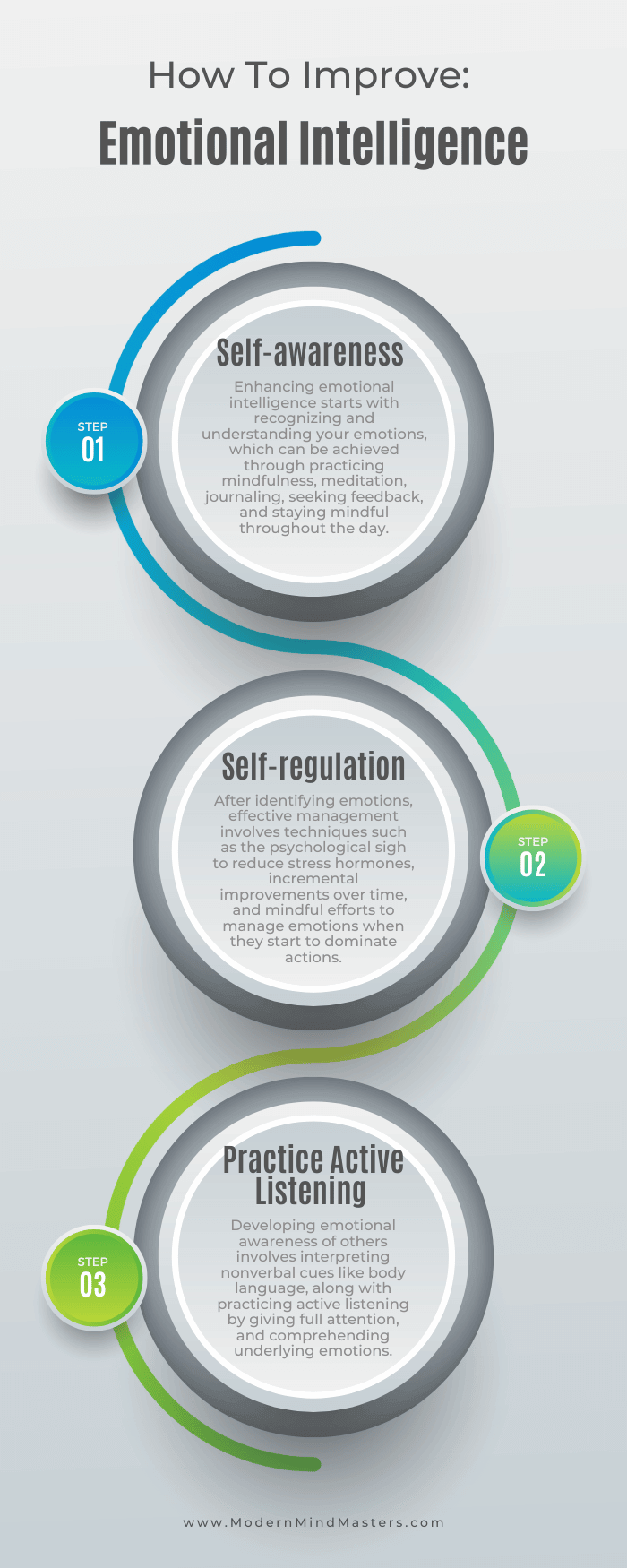
Habits Are The Foundation Of Success
Knowledge is not power without action, and habits form the consistent actions that compound over time to guarantee success.

Emotions are the universal currency of communication; humans express anger and frustration to convey displeasure or smiles and laughter to demonstrate their comfort around those we trust.
For better or worse, most of our thoughts and actions are driven by emotion, and our ability to read these emotions in others is what makes us a prosperous species. We can show compassion when sensing sadness in others or engage in the “fight or flight” response when perceiving hostility. Emotions not only ensure we survive, they enable us to thrive.
How well we perceive and understand emotions determines how successfully we use and manage them, a concept known as emotional intelligence. And the higher our emotional intelligence, the more we can successfully interact with others.
This article will overview the importance of emotional intelligence in all aspects of life, from physical and mental health to success in the workplace and as a leader. More importantly, we will see that, unlike cognitive intelligence (IQ), emotional intelligence is a skill that, like any other, can be learned, practiced, and improved.
Emotional intelligence, also known as the emotional quotient (EQ), refers to the ability to perceive, understand, use, and manage your emotions as well as the emotions of others.
Unlike the intelligence quotient (IQ), which can be measured directly using a specific test, emotional intelligence (known as EQ) is a more subjective experience with no metrics that can quantify it. As a result, many fields of science consider EQ a “pseudo-science”, with some even labeling it “pop psychology”.
Regardless of its official status, it is clear that some people are better at managing their own emotions and reading those of others, a skill highly valued in leaders and the workplace in general. The interest in emotional intelligence, therefore, stems from a wish to utilize this field for self-improvement.
There are three common models of emotional intelligence: ability, trait, and mixed.
The ability model was conceived to define emotional intelligence within the confines of the standard criteria for a new type of intelligence. It comprises four proposed abilities: perceiving, understanding, using, and managing emotions.
This refers to the ability to detect and decipher emotions in faces, pictures, and voices, including the ability to identify our own emotions. The ability to perceive emotions is the most fundamental aspect of emotional intelligence, as it collects the data upon which all other emotional intelligence-based decisions can be made.
Once we have perceived an emotion, that is, collected sensory information, the next step is to process and understand it. Here is where the magnitude of our emotional intelligence comes into play; some emotions are very subtle and difficult to distinguish from others.
For example, a colleague may seem frustrated and fed up at work, and we might assume that this person does not enjoy their job. The real reason for their frustration, however, might be a personal family event. Where this person seems frustrated, they might be upset with a different problem altogether, but with nowhere else to vent, their emotions manifest as frustration at work.
Once we have perceived and (hopefully) correctly understood an emotion, we can use it to facilitate various cognitive activities, such as thinking and problem-solving. An emotionally intelligent individual can capitalize on changing emotions and moods to best fit the task at hand.
Managing emotions ensures we can regulate them in both ourselves and others. Emotion is the dominant driver of actions, many of which can be irrational and regrettable, such as road rage or replying angrily to an email.
Such actions often cause more harm than good, but such is the power of raw emotion. Learning to manage this, therefore, will give the emotionally intelligent person a compelling advantage in decision-making.

A second model introduced by Daniel Goleman in his iconic book “Emotional Intelligence: Why It Can Matter More Than IQ” focuses on emotional intelligence as a set of skills and competencies that drive leadership performance.
Goleman’s model outlines five emotional intelligence constructs:
From Goleman’s writings, we learn that emotional competencies are not innate talents, but rather learned capabilities that must be practiced and improved with time and experience.
While Goleman’s model of emotional intelligence has been criticized in some research literature as “pop psychology”, his model and teachings still endure today, with many self-improvement courses focusing on his five emotional intelligence constructs.

Like how the intelligence quotient (IQ) aims to quantify cognitive intelligence, the emotional quotient (EQ), is a way of attempting to quantify emotional intelligence.
Unlike IQ, however, which is standardized and widely recognized, EQ measurement methods can vary and are not standardized.
In essence, there is no tangible EQ metric; when people refer to an emotional quotient, they are usually referring to emotional intelligence, and the two terms are used interchangeably.
Emotional intelligence is highly important for two main reasons; we can better regulate and manage our own emotions while communicating and interacting more successfully with others, benefitting many aspects of life.
Studies show that people with high EI have greater physical health. This study explores the relationship between emotional intelligence and physical and mental health among nurses in educational hospitals and found that EI training had a positive effect on the health of nurses, with emotional intelligence scores increasing significantly in the intervention group after the training, while general health scores also improved.
This study explored the relationship between emotional intelligence (EI) and mental health outcomes during the COVID-19 pandemic. Participants who took part in the EI training program demonstrated significantly lower levels of depression, suicidal ideation, and state anxiety compared to those in a placebo training group, supporting previous research indicating a positive relationship between emotional intelligence and mental health outcomes.
Emotional intelligence, and being about to look introspectively, is a fundamental component of self-evaluation and key to finding inner peace.
Emotional intelligence is increasingly in demand among prospective employers; 71% of employers value emotional intelligence (EQ) over cognitive intelligence (IQ), according to a CareerBuilder survey. With artificial intelligence replacing some of the harder cognitive skills, its lack of capability to manage people and emotions is increasing demand for emotionally intelligent workers.
The World Economic Forum’s “Future of Jobs Survey 2020” projected that emotional intelligence will be one of the top skills needed in business in 2025, as employers consider its importance in the workplace as an indicator of a prospective employee’s capabilities.
Other key components that dictate success in the workplace that stem from having a high emotional intelligence include:

Seeing how emotional intelligence is a valuable trait in the workplace, it may come as no surprise that it also proves an invaluable quality in effective leaders.
In the Harvard Business Review article “What Makes a Leader?”, Goleman spoke to the importance of emotional intelligence in leadership success, citing numerous studies that demonstrated it as a distinguishing factor that separates great leaders from average ones.
This caught the attention of several large firms, specifically Johnson & Johnson’s Consumer Companies, who funded a study that concluded that there was a strong relationship between superior performing leaders and emotional competence.

The good news is that unlike IQ, which is mostly determined by genetics, and almost impossible to significantly improve through practice, emotional intelligence is a skill that can be practiced and improved like any other. Although some are naturally more emotionally intelligent than others, everyone stands a good chance of improving to a significant degree.
This study investigated to what degree emotional intelligence can be improved, where 54 senior managers from a large and long-standing international company were split into two groups, one of which received EI training and the other a placebo-controlled training course.
After the EI training program, the experimental group showed significant improvements in most emotional intelligence variables (intrapersonal, stress management, and general mood) compared to the control group. These improvements were observed immediately after the program and were sustained one year later.
Emotional intelligence is a complex arena; like any skill, it can be improved through practice and effort, but the level of difficulty varies from person to person. While some might find it more challenging than others due to personality traits, upbringing, or life experiences, one fact remains common to everyone; practice makes perfect.
To manage your emotions you first have to recognize and understand them. This is no easy task and will take time, but there are some exercises you can adopt into your daily routine to help you become more aware of emotions.
Firstly, practice mindfulness, the lost art of being fully aware of the present moment without judgment or distraction. While I have a whole article on the importance of mindfulness and the benefits of practicing it, meditation is the most accessible way to learn to identify and sit comfortably with your emotions.
Meditation gets a bad rap for its perception as a useless endeavor, but I can guarantee that nothing brings your emotions into your foremind as quickly and intensely as sitting in silence with nothing but your thoughts.
Journaling, where you write your emotions down as you identify them, and seeking feedback from others (friends, family, and colleagues) are other ways to help identify and analyze your emotions.
Otherwise, try to remain mindful of your emotions throughout the day. Whether angry at a work email or joyous after your sports team won, try to identify and remain conscious of when these feelings appear and how they affect your mood, thoughts, and actions.
Only once you have identified the emotions affecting you and others can you begin to manage them.
Books such as The Chimp Paradox by Dr. Steve Peters, and Flourish by Dr. Martin Seligman, provide excellent techniques for learning to manage your emotions.
Emotional duress often manifests as stress, which results in what is known as the stress response, the body’s physiological and psychological reaction to perceived threats.
The stress response is a biological mechanism that results in increased heart rate as well as an increase in hormones such as cortisol and adrenaline, compounds that help you deal with immediate threats, such as instigating the fight or flight response. Prolonged exposure to such stress hormones, however, will have detrimental effects.
Exercises such as the physiological sigh, a way of breathing that reduces stress hormones, can help reduce anxiety levels and allow you to gain control of your emotions.
There is no easy fix for managing your emotions; improvement comes from small and incremental improvements over time. As long as you are mindful of your emotional states of mind and actively try to manage them when they begin to dominate your actions, improvement will soon follow.
Understanding and managing your emotions is only half of emotional intelligence; the other half involves the emotional awareness of others.
Most experts agree that 70 to 93% of all communication is nonverbal, meaning we need to become experts at interpreting these nonverbal cues, such as body language. Read up on some basic body language cues, such as tapping of hands or feet indicating nervousness, or crossed arms showing discomfort.
Most importantly, practice the art of active listening. Most make the common mistake of listening to reply, that is, they start thinking about what they will say while the other person is still talking, thereby missing a lot of valuable information.
By active listening, where we give full attention to the speaker, you can begin to not only understand the words being said, but also comprehend the underlying emotions, intentions, and context, fostering effective communication and building rapport.
Simply allowing a person to speak and fully explain their thoughts, feelings, and emotions will make the other person feel highly valued. When someone explains to you that they are stressed, don’t try to offer a solution immediately.
Allow the other person to vent by asking questions such as, “Why do you feel that?”, or “What makes you believe that?” Show empathy by understanding their frustrations or sadness, and offer an empathetic shoulder for them to lay their head on.
There is no set list of exercises that help you build up your emotional intelligence. EI is a complex field, and emotional expression can be very subtle. Every situation is unique, but as long as you build your self-awareness, practice emotional self-management, and show genuine empathy for others by listening and displaying empathy, you will be well on your way to mastering your emotional intelligence.

While emotions serve as the primal force guiding our decisions and actions, it is our proficiency in deciphering and handling them that underscores our triumph as the dominant species.
Through emotional intelligence, we harness the power of empathy, self-awareness, and interpersonal skills, elevating our physical and mental well-being, driving our success in the workplace, nurturing leadership qualities, and fostering profound connections.
The journey towards improving your emotional intelligence is not only feasible but essential. Unlike cognitive intelligence, which tends to be less malleable, emotional intelligence proves to be a skill honed through conscious effort, training, and practice. In a world where emotional competence is increasingly prized, the significance of emotional intelligence becomes more evident than ever.
Emotional intelligence, also known as the emotional quotient (EQ), refers to the ability to perceive, understand, use, and manage your emotions as well as the emotions of others.
Higher emotional intelligence has been linked to greater physical and mental health, as well as increased success and performance in the workplace and for leadership.
Unlike IQ, emotional intelligence is a skill that can be learned, practiced, and improved in anyone willing to invest time and effort.

Knowledge is not power without action, and habits form the consistent actions that compound over time to guarantee success.

The negativity bias – our tendency to react more readily to negative stimuli – affects every thought and action we make. But it is not our fault, in fact, it is biological.

Explore practical strategies on how to overcome laziness, embracing laziness as natural and tackling it with rest, planning, and reframing success.”

Follow these 7 simple steps that work alongside your body to learn how to stop oversleeping.

There are 3 rules for intermittent fasting for weight loss and health benefits that must be followed to extract benefits such as organ health and enhanced cellular repair.

Reverse osmosis water filter systems are the gold standard in water filtration, effectively removing a wide range of contaminants and disinfectant byproducts.
© 2025 Modern Mind Masters - All Rights Reserved
You’ll Learn:
Effective Immediately: 5 Powerful Changes Now, To Improve Your Life Tomorrow.
Click the purple button and we’ll email you your free copy.